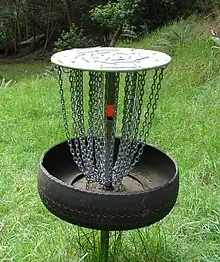Basket (disc golf)
A basket is by far the most common type of target used in disc golf. It features a disc-catching basket under a deflection assembly generally made out of chain.[1] Permanent baskets on courses are built on an anchored metal pole, but portable disc golf baskets with foldable mechanisms to facilitate transportation also exist.[2][3]
%252C_hotel_Luna%252C_diskgolf_(1).jpg.webp)
History
Disc Golf Association's[4] Mach 1 Disc Pole Hole disc golf basket was invented by Ed Headrick.[5][6] It was the first formal disc golf target to incorporate chains and a basket on a pole, and became the Technical Standards used by the PDGA.[7] Before the advent of the standardized basket, early competing designs existed, including cone baskets and tone poles.[8][9]
Specifications
The highest governing body in disc golf, the Professional Disc Golf Association (PDGA), classifies baskets into three categories, based upon hierarchical criteria: championship, standard, and basic.[1]
The PDGA defines baskets as:
Basket Targets are constructed with a basket and typically have a deflection assembly above it. Object Targets, like a simple marked post, have an identified target zone but no basket.[1]
Permanent baskets
Most disc golf courses feature permanent baskets, which are bolted to an anchor embedded in the ground with a concrete base. They are secured using a padlock, and can be pulled out for maintenance.[10]
Non-commercially available baskets

Artisanal, custom, DIY, homemade, improvised, jerry-rigged, upcycled, or otherwise non-commercially available baskets are not uncommon in disc golf. They are most often designed and built by private individuals who use them for backyard putting practice.[11] They can also be found on pirate courses, on community courses in areas with limited funding, and on certain military bases.
The PDGA deems DIY baskets acceptable for the lowest tier competitions,[12] but recommends submitting a sample basket to the PDGA Technical Standards Working Group (TSWG) for proper target certification.[13]
DIY baskets can be made from scratch using of wood or metal, or they can be built by combining existing parts, such as tires and chains.
References
- "Technical Standards - Manufacturer Guidelines for Obtaining PDGA Approval of Golf Discs and Targets" (PDF). Professional Disc Golf Association. 2020-06-08. p. 7. Retrieved 15 June 2020.
- Schurman, Kyle (2020-04-24). "The best disc golf basket". Chicago Tribune. Retrieved 2020-12-28.
- Foster, Corey (2020-07-22). "Put a portable disc golf basket in your yard for less than $59". San Francisco Chronicle. Retrieved 2020-12-28.
- Disc Golf Association, 2020-10-23, retrieved 2020-10-23
- "FLYING DISC ENTRAPMENT DEVICE. Aug. 2, 1977" (PDF). Retrieved June 27, 2013.
- "DISC GOLF ASSOCIATION, INC., Plaintiff-Appellant, v. CHAMPION DISCS, INC., a California Corporation, Defendant-Appellee". Court Listener. 1998-09-15. Retrieved 2020-12-28.
- PDGA. "PDGA Technical Standards". PDGA. Archived from the original on 2008-12-16. Retrieved 2020-12-28.
- Cleghorn, Ian (2020-07-28). "Cones & Tones: Alternative Disc Golf Targets That Almost Stuck". Release Point. Retrieved 2021-01-05.
- Cleghorn, Ian (2020-07-09). "How We Became Basket Cases: Disc Golf Basket History". Release Point. Archived from the original on 2021-01-06. Retrieved 2021-01-05.
- S. Miller, Randy (2020-06-01). "The Specifics of a Disc Golf Basket". Cypress Point Disc Golf. Archived from the original on 2020-08-07. Retrieved 2021-01-05.
- Childers, Brad (2000-01-16). "HomeMadeBaskets". BadBrad's Home Page. Archived from the original on 2000-01-16. Retrieved 2023-07-09.
- PDGA. "Frequently Asked Questions - Course Development". PDGA. Archived from the original on 2011-04-30. Retrieved 2020-12-28.
- PDGA. "PDGA Disc Golf Target Certification Request". PDGA. Archived from the original on 2020-10-27. Retrieved 2020-12-28.
External links
 Media related to Disc golf baskets at Wikimedia Commons
Media related to Disc golf baskets at Wikimedia Commons- PDGA Disc Golf Target Specifications
- PDGA-Approved Disc Golf Targets
- PDGA-Approved Targets by Year
- Making of DIY disc golf basket (in Korean)
- PDGA-Approved Disc Golf Basket in The USA